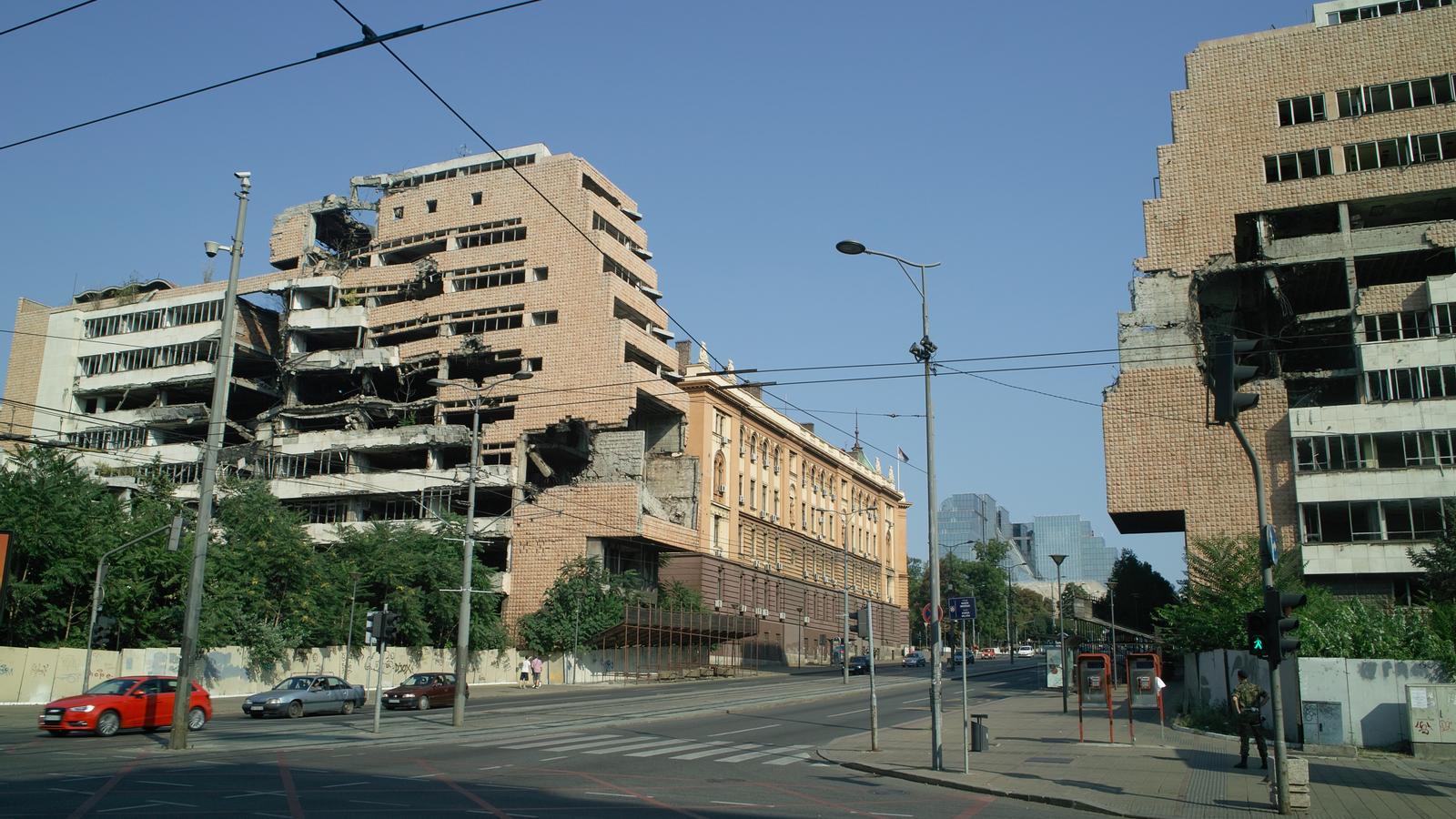Trump Tower, which Serbs consider a war provocation
Experts and organizations denounce the Serbian government's sacrifice of the armed forces complex bombed by NATO in 1999 for political interests.


BarcelonaWhen you walk past the Generalstab in Belgrade, you feel overwhelmed by the weight of memory. The former Serbian armed forces building retains its charred facade and bare structure just as it was after the city was bombed by US planes in 1999. Half through negligence, half through political intent, the former headquarters of the Yugoslav armed forces has remained intact ever since.
For a time, it seemed that the hidden interest behind this deliberate abandonment of the building was to foster a victim narrative that reminded us which side the enemy bombs were coming from: the United States, that is, NATO. But if anything has characterized the last twelve years of the Serbian president's term, Alexander Vucic, has been able to swim between two watersNow, as the winds of Washington blow from a different direction, the Serbian government is also changing course: the building that has symbolized national suffering for the past 25 years will become a Trump Tower.
The driving force behind the project is none other than the same son-in-law of Republican President Jared Kushner, that a year ago now expressed interest in acquiring this building and other land in the region for a luxury resort. "Excited to share some early design images," Kushner wrote on social media, sharing an image of two large towers with the Belgrade skyline in the background.
It wasn't until November that the Serbian government finally agreed with Affinity Global Development, an investment firm owned by Trump's son-in-law, to demolish the former headquarters of the general staff and build a complex in its place, which will include a Trump-branded hotel and 1,500 apartments. In total, the project is set to cost €500 million.
An architectural gem
To achieve this, the government had to remove the building from the list of cultural assets, where it has been listed since 2005, which required it to preserve its "authentic appearance." For this reason, most experts criticize the move as politically motivated. Upon learning of the decision, organizations dedicated to heritage conservation cried foul. The Europa Nostra association, dedicated to the preservation of historical monuments, warned in a manifesto that the demolition of the Generalstab "would erase a unique piece of cultural heritage" while "setting a dangerous precedent" for the future protection and management of other monuments in the country. The organization joined the voices of 350 experts and organizations such as the Serbian Academy of Sciences and Arts, ICOMOS, and the International Union of Architects, who had also denounced the Belgrade government's decision.
"There are at least two reasons that make this building very important," Marko Stoianovic, an art historian specializing in architectural history, explains to ARA. "On the one hand, it's by the renowned architect Nikola Dobrovic," who combined German Expressionism with a futuristic, modern style and used stone from Yugoslavia in "a unique way." On the other hand, it has considerable historical significance, as it stands as "a living reminder of the resistance to the 1999 bombing."
Stoianovic's hypothesis, then, is that what motivated the rezoning of the architectural complex, which would be the fifth Trump Tower in the world, is nothing more than political and economic interests. "None of the governments since 2000 has been willing to invest money in the necessary reconstruction of the Generalstab," he says, "but now politicians have seen an opportunity." He sums up the controversy thus: "The price of friendship with the United States is destroying our heritage."
The US strategy in the Balkans
Business—as long as it's favorable—is the preferred strategy of the new US administration to forge alliances with other countries, and Belgrade is no exception. But beyond economic performance, the movement is part of a broader White House strategy in the region. In addition to Jared Kushner, the US leader has other key men in Serbia, such as Richard Grenell and Rod Blagojevich—whom Trump pardoned in February after spending eight years in prison for corruption, and who now lobbies for the Serb-majority entity within BosniaGrenell, who served as special envoy to the Balkans during Trump's first term, was the driving force behind the project to convert the Generalstab into a luxury resort a decade ago, when it failed. Now he has served as a liaison between Kushner and Belgrade to carry it out.
Likewise, the project's symbolic location—in the heart of Belgrade—sends a clear message to Brussels: Washington prioritizes its interests over European influence in the Balkans. It is no surprise, then, that the EU institutions have received the news like a bucket of cold water. Above all, Considering that they have long suffered from the erosion of relations with Serbia, where the majority of the population has become pessimistic about the prospects for EU accession.
However, amid this uncertainty, Vucic has seen an opportunity to "capitalize on its position as a geopolitical crossroads of the great powers," according to analyst Miguel Roán in an article for the Elcano Royal Institute. The Serbian leader has always boasted about his country's impartiality, which does not belong to either NATO or the Collective Security Treaty Organization, in order to place itself in an advantageous position as a negotiating actor. And this stance has been accentuated with Trump's emergence in the White House. In fact, Vucic has repeatedly offered to host a summit between the US president and his Russian counterpart, Vladimir Putin. "There is no country that can compare with Serbia in terms of the level of support for Trump," he said on the one hand, while on the other, he asserted that "Putin remains very, very popular" in the country. A move that, as in the case of the Generalstab, secures him a place in the new world order.
